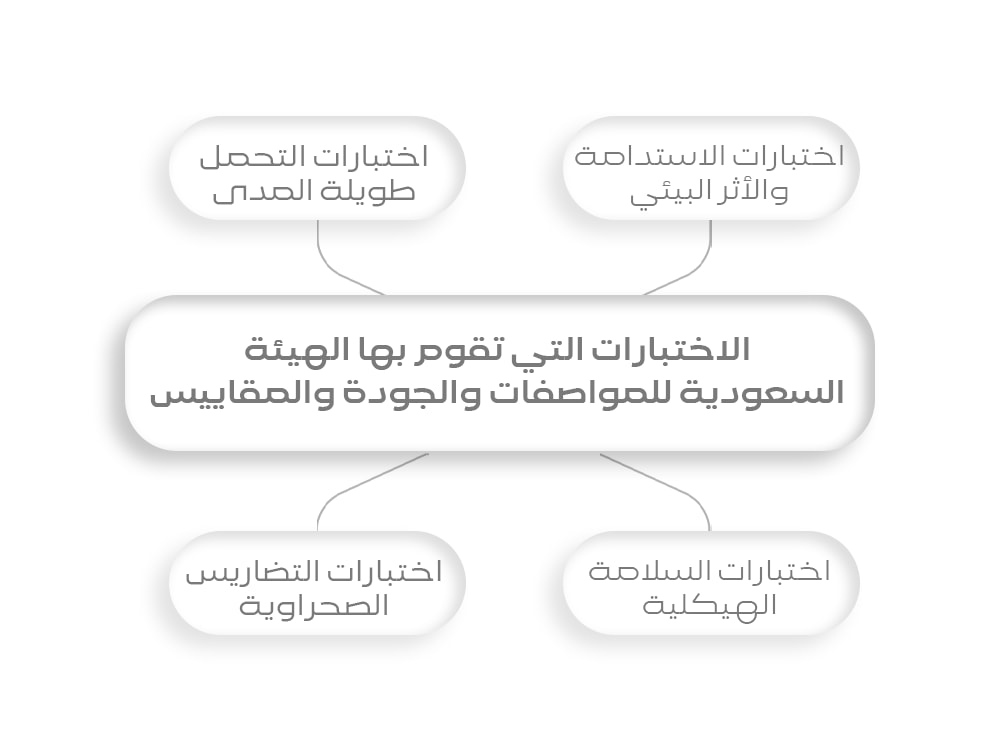In a world of intense competition for consumer industries, the Saudi Quality Mark stands out as the guardian of quality and precautionary standards for safety and feasibility. This edifice was created by the Kingdom of Saudi Arabia to serve as a barrier between low-quality and poorly standard products and the financial and life safety of citizens. This certificate is not just a slogan printed on the product or a paper hanging on the company walls. It is a commitment to honesty and high trust, and an expression of the strong relationship between the Saudi citizen and the government in the Kingdom of Saudi Arabia. This certificate is not easily obtained and cannot be bypassed quickly, because the Saudi Authority Standards, Metrology and Quality have organized tough tests that challenge bad and weak products. These tests are compatible with the requirements of the environment and climate in the Kingdom of Saudi Arabia.
If truck tires represent the first line of defense for trucks and the first direct dividing line between the truck and the road, then Darbek Tire Company presents itself as an authentic Saudi knight who rises to the Saudi market and challenges the global competition. All of this is based on the confidence of consumer drivers and logistics fleet owners in the quality of Darbek's products, supported by the strict tests in the Saudi Organization for Standardization, Metrology and Quality (SASO). The success story of Darbek Tire Company continues to be the story of the development of the Saudi quality brand. They are a reflection of the relentless efforts of the people and government of the Kingdom of Saudi Arabia to develop industrial fields Entering global markets, while contributing to domestic sufficiency with homemade products, all of this comes in line with Saudi Arabia's Vision 2030.
In this article, we will be on a date with the overall developments of the Saudi quality brand with its impact on local products. Examples include the products of Darbek Tire Company, which is the largest leader in the field of tire manufacturing in the Kingdom of Saudi Arabia, while examining the importance of this matter and its industrial and investment consequences on the Saudi market, which is considered one of the best and largest markets in the Middle East and the Arabian Gulf, while highlighting the competitive foundations that made Darbek Tire Company enter the competitive market with the most prestigious international products.
What is the Saudi Quality Mark?
The Saudi Quality Mark (SQM/Saudi Quality Mark) represents an integrated system of mandatory technical control. This integrated system has been supervised by the Saudi Organization for Standardization, Metrology and Quality (SASO) since its establishment by Royal Decree No. (10/M), which was stipulated in 1392 AH. This mark is not a recreational choice, but a binding legal requirement, without which products entering the Kingdom of Saudi Arabia are not granted the right to enter the Saudi market, especially in vital sectors such as truck tires, which are the largest commercial line in the Kingdom of Saudi Arabia, as the local and regional economy depends on trade Land, which greatly enhances the importance of focusing on the quality and efficiency of tires. This makes it a matter of lives of millions of people daily and the millions of dollars and rials that circulate in the Saudi commercial road network.
The philosophy of the Saudi Quality Mark is that it seeks to achieve a three-dimensional balance: human safety, technical quality, environmental protection, When SASO grants a certificate of conformity to Derbek tires, it guarantees to the consumer that this product has passed a complex series of tests that simulate the harshest road conditions in the Kingdom of Saudi Arabia, starting with continuous high temperature tests, which exceed half the boiling point in many summer days in Saudi Arabia, as well as the diversity of natural environments and different work areas. Trucks operating in the oil field are totally different from those that transport commercial goods, which makes us understand the importance of the Saudi quality mark by knowing the importance of the conditions and their impact On the performance of tires and other products.
The Saudi Quality Mark is based on a solid regulatory framework. Saudi standards are integrated with the Gulf Technical Regulations (GSO) in a manner that respects local and regional particularities in order to maintain global and regional harmony, especially that many trucks traveling in the Saudi road network are connected to the Gulf commercial roads. For example, the “GSO 249/2018 Technical Regulation” does not limit its work to basic performance requirements but also imposes more complementary conditions, such as the resistance of tires to penetration by sharp stones on rough roads and others, and that the minimum depth of the tread in tires The new truck tires are not less than 8 mm, with the addition of requirements related to reducing the noise level caused by tires. This regulatory integration between Saudi standards and their counterparts in the GCC countries reflects a future vision in developing the joint commercial sector between countries in the region.
Who is Darbek Tire Company?
Derbek was founded on the development of industrial fields in the Kingdom of Saudi Arabia. With this ambitious goal, the company sought to provide truck tires compatible with the Saudi environment, while working on a vision to localize tire industries in the Kingdom of Saudi Arabia. By 2030, Darbek seeks to be the first Saudi national factory to produce tires entirely with Saudi materials and arms. This ambition is not just unrealistic assumptions. Darbek has preceded everyone and has worked to design custom tires for each Saudi region, while customizing tires that are compatible with the changing and diverse environment in the Kingdom of Saudi Arabia. Make the company achieve a great achievement as a startup that independently engineers its products.
What are the international quality marks and standards?
In order to understand the excellence achieved by the Saudi quality mark and understand the additional value it offers to products and consumers, it is necessary to look at the types of quality certificates and their differences from one region to another in order to adapt to the different environments between Europe, America, China and others.
- (ECE R30) European certification: This certified certification represents the backbone of the quality of European products in Europe and abroad, as it focuses on three main indispensable areas: safety on wet roads, reducing environmental noise, and reducing rolling resistance in order to improve energy efficiency. These standards are very accurate, especially in terms of grip on wet surfaces or dealing with accumulated snow or frozen ground. European standards require that the stopping distance be less than 20 meters when rising from 80 kilometers per hour. However, the need is to rule on European standards because they do not deal with The effects of high heat because the European climate is considered moderate in temperatures, making them give priority to dealing with humidity and ice.
- U.S. (DOT) certification: This certificate is issued by the U.S. Department of Transportation (Department of Transportation). It specializes in tires. It focuses on the durability and strength of tires while traveling on long roads at high speeds and excessive loads. This American certification is characterized by the fact that it focuses on dynamic thermal endurance. The tire is heated to 100 degrees Celsius under a maximum load of 15%, reflecting the strength that the United States of America wants its tires to have, but these tests do not include dealing with the desert environment, but they are excellent for long trips And very heavy loads.
- Brazilian (NMETRO) certificate: It is designed specifically to meet the challenges of tropical roads and very high temperatures, as it makes tires undergo tests under mud, muddy and flooded conditions in order to ensure their quality in dealing with slip aids. This reflects the experience of Brazilian specialists in determining tire quality and differentiating between tires that are able to deal with floods and torrents and tires that cannot withstand such difficult conditions.
- Saudi Quality Mark (SASO): It comes as a unique technical and engineering application that combines strict international standards and specifications with the specificity of the local environment in the Kingdom of Saudi Arabia, depending on the needs of the natural environment of the road network in the Kingdom of Saudi Arabia, which is characterized by being very high temperatures, long distances and external roads linking major cities to the countries of the Gulf Cooperation Council. This environmental adaptation that the Saudi Organization for Standardization, Metrology and Quality is working to achieve is what makes the certificate of obtaining the Saudi Quality Mark important for many companies and products.
Tests carried out by the Saudi Organization for Standardization, Quality and Metrology
In the Kingdom of Saudi Arabia, products, especially tires, go through a difficult test journey in the laboratories of the Saudi Organization for Standardization, Metrology and Quality. This great journey begins immediately after the tires leave the production line and continues until it ends after passing more than fifty tests in accordance with international standards (ISO/IEC 17025). This journey is divided into four main stages, each of which represents a challenge for quality and perfect performance.

Stage 1: Structural Safety Tests
At this stage, tires are placed on giant devices and machines that simulate road conditions, which test tires under these different conditions. One of these challenges is the High-Speed Test. The tire is placed in a sealed chamber and then rotated at increasing speeds starting from 100 km/h and up to 180 km/h, with loads and weights gradually added until it reaches 150 percent of the maximum allowed tire in order to know the point of tire explosion. This process lasts up to 120 minutes continuously, while monitoring the temperature and pressure conditions inside the test chamber and determining the changes that occur Follow it up until it is confirmed that the tire has passed the speed and load test, which means that the tire is able to deal with sudden pressure and high speeds for a relatively long period of time, which clearly indicates the high reliability of the Saudi Quality Mark, which subjects tires to real high-precision tests.
Then, the temperature of the test chamber is raised to half the boiling point and the tire load is increased to 130 percent. The test chamber temperature is raised to half the boiling point and the tire load is increased to 130 percent. The test continues for 72 hours continuously without stopping, as the measuring devices work to determine the rate of deterioration of rubber properties under severe and continuous thermal stress, which, of course, will be exposed to tires for a longer period in the network of commercial roads within the Kingdom of Saudi Arabia and the Arabian Gulf.
Phase 2: Desert terrain tests
Special laboratories are equipped to simulate desert and rocky environments in which sand density is high. Tires are subjected to a series of tests designed specifically for the changing conditions in the Kingdom of Saudi Arabia. The most important of these tests is the penetration test of sharp sand. Tires are placed on a rotating cylinder covered with sharp rocks and pumped at a 45-degree angle, then a load equivalent to 1.5 tons of weights is dropped. The efficiency of rubber in resisting stones and rocks that scratch the side wall is measured, and its tolerance to puncture and cracking is determined. Then comes the braking test on desert sand, which often covers highways in In the Kingdom of Saudi Arabia, the stopping distance is measured at 100 km/h. Thus, the stopping distance of tires and the level of lateral deviation that occurs are determined. Then, the stability of tires is tested on sand-covered slopes, making us find a detailed result of tires' endurance and efficiency under changing conditions in the Kingdom of Saudi Arabia.
Phase 3: Sustainability and Environmental Impact Tests
The Saudi Organization for Standardization, Metrology and Quality is working to impose strict standards to reduce the environmental effects of tires. This is done by conducting rolling resistance tests, in which the amount of energy wasted due to the friction process between the tire and the asphalt road surface is measured. The waste energy must be less than 10.5 N/kN according to SASO standards, which is lower than the European standard (12.5 N/KN), making tires that receive the Saudi quality mark less fuel consumption and safer for the environment, in addition to external noise measurement tests that are tested in a sound-insulated room Recording the sounds produced by tires at different speeds, with a maximum limit of 72 decibels at a speed of 80 km/h, while analyzing the level of rubber fragmentation during the traffic process in order to identify the residues resulting from the friction process on the highway. This makes tires safer for the environment and the quality of the asphalt road as non-scattered rubber significantly reduces the levels of interaction of asphalt with damaged rubber parts. This makes tires that have the Saudi Quality Mark very safe tires.
Stage 4: long-term endurance tests
Here, at this stage, tires are subjected to real life simulation tests through advanced simulation equipment and rooms, including the virtual track device, which simulates driving a distance of 100,000 kilometers, on a variety of different roads, with the addition of thermodynamic loading tests that expose tires to sudden and fluctuating thermal changes within a few minutes, while determining accurate measurements through which the exact rate of tread wear on a normal road can be determined, giving experts the ability to determine the life span of tires according to this information and data. These comprehensive tests ensure that all Tires are identical to these models that have been fully examined by controlling the manufacturing process and keeping the quality constant throughout the manufacturing process.
Four stages of intensive testing on tires to be allowed to be approved by the Saudi Organization for Standardization, Metrology and Quality
What are the most important tires offered by Derbek Saudi Tire Company?
- A number of lines
The “Dasat Lines” tire is the ideal and most reliable partner for drivers on commercial highways. It is a tire intended for trucks. It is characterized by strength and rigidity with the ability to withstand the difficult challenges associated with long roads and continuous commercial trips. Thanks to systems such as (Cushioning System), the driving experience on these tires is incredibly exceptional, with a unique design of grooves and channels carved on the tread, which provides a contact area with the road that is suitable for the tasks that the Pedal Lines tire works with, with the tread being drawn in the form of winding lines similar to the letter Z.
- Dasat Sir
The tires in the Dasar category represent the result of Saudi innovation in developing tires suitable for domestic roads, as they are equipped with techniques to reduce the heat caused by friction, while distributing grooves in an engineering manner that gives tires additional cooling, making them smoother and less fuel-consuming on the roads due to the low torque that Darbek has worked to make all its tires have less resistance to rotation.
- Daasat Maidan
Engineering teams have worked to develop the Meydan mat to be the most balanced on various roads while enhancing high temperature resistance by enhancing the chemical composition of the rubber used, making it less noisy and longer lasting. The steel belts have been reinforced to have four four-layer belts, which means significantly increased protection against puncture and disintegration, in addition to superior resistance to abrasion and cracking.
Tires from Derbek are reliable for difficult tasks because they are specially developed for the environment of the Kingdom of Saudi Arabia







